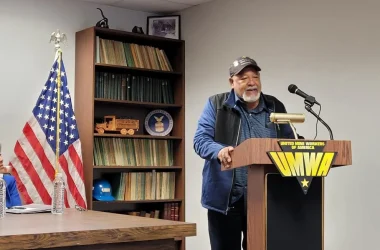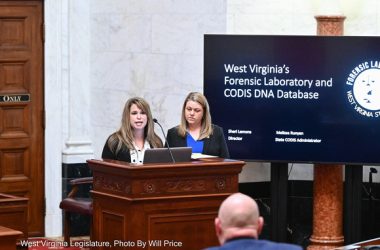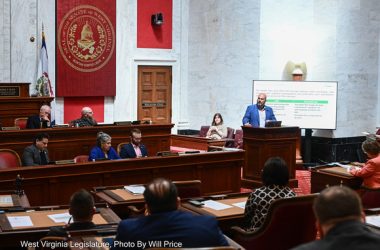By JESSICA FARRISH
The Register-Herald
BECKLEY, W.Va. — He was known as a genius, a healer, a tea enthusiast and an advocate.
As those in Beckley and Oak Hill drew together in grief Wednesday to mourn the sudden loss of Dr. Hassan Amjad, they remembered a man of diverse knowledge and talents, whose achievements in the medical, literary and environmental fields were matched by his compassion and desire to serve those in his adopted community.

“Here was a man who was a giant walking among us,” former West Virginia delegate Virginia Mahan of Summers County said. “I am so saddened to receive this news.
West Virginia State Police found Amjad around 9 p.m. Tuesday in his vehicle, slumped over the steering wheel, apparently dead of a possible heart attack. He was parked at the side of an undisclosed roadway, where he had evidently pulled his vehicle, his daughter, Dr. Ayne Amjad of Beckley confirmed Wednesday.
Amjad, an internal medicine specialist who had practiced for 42 years, had offices in Beckley and Oak Hill. He was an advocate for the health and environmental rights of those in disenfranchised communities. In the 1980s until 1994, Amjad, a former chief of staff at a Veteran’s Administration Medical Center (VAMC), served as medical adviser for Concerned Citizens to Save Fayette County (CCSFC), a citizen’s group that was formed to monitor a PCB clean-up effort by the United States Environmental Protection Agency (EPA) at Minden. The town was an EPA Superfund site and Greenpeace has identified it as one of the most contaminated towns in America.
In the mid-1980s, Amjad told Minden residents, reporters and officials from EPA, the Centers for Disease Control and Prevention and the Agency of Toxic Substances and Disease Registry (ATSDR) that PCB, an industrial chemical, causes cancer. Since 1996, the EPA has listed PCB as a “probable” carcinogen — a listing Amjad had criticized in recent weeks as weak.
From May until his death, Amjad had been collecting medical data from former and current residents of Minden. The doctor reported that PCB exposure had caused cancer in the unincorporated town while federal and state officials ignored their plight. He said earlier this month that he was determined to create a registry and a map showing the incidences of cancer and proving a link between the cancers and PCB contamination. From 1994, he had publicly pressed state and federal agencies to take action on behalf of Minden residents.
A week prior to his death, Amjad told The Register-Herald that the PCB project was his “life’s work.” The project was featured in a short documentary by Univision and received more than a million views on social media. Media outlets in New York and London had contacted Amjad regarding the Minden PCB project.
He was careful to tell reporters that his name didn’t need mentioned in the press as long as the PCB impact on Fayette County was made public.
Amjad family friend Humera Faheem remembered the doctor.
“I have had the honor of knowing Uncle Amjad since my childhood,” Faheem said. “I will always remember his kindness, compassion, caring, determination and perseverance.
“He is what legends are made of… Our entire family is mourning.”
Faheem said that her parents, Dr. Ahmed and Najma Faheem of Daniels, joined her in offering deep condolences to the Amjad family.
Local residents recalled a man who cared deeply about patients and the practice of medicine.
“I have never met a more compassionate person,” Natalie Coots of Raleigh County said Wednesday. “He was my dad’s doctor.
“When my dad passed from lung cancer, he cried with our family. Humanity is a great gift in a physician.”
Misty Mehta of Beckley added, “His patients and community were never just a number to him.”
Many reacted to the news on social media.
“I don’t think a lot of people realized just how intelligent he was,” said Becky Saye, whose father had been Amjad’s patient. “I’ll admit, I questioned some things he did as my dad’s doctor, but he would always be right.”
“He was such a great person. And so kind,” said Annetta Coffman, who met Amjad when he was collecting data for his cancer registry.
When the opioid epidemic overwhelmed southern West Virginia, Amjad worked closely with substance abuse disorder patients. He was a proponent of using Subuxone, a synthetic opioid, to wean patients from illegal narcotics, and he urged local churches, family members and the judicial system to work together to help patients recover from addiction.
Beth Webb of Glen Daniel credited Amjad Wednesday with helping her and her husband, James Webb, recover from substance abuse disorder.
“Dr. Amjad was not only my doctor over the past eight years, he has become my friend and like a father figure to me,” Webb said. “I have never met a doctor so caring and giving with their patients.”
She said Amjad often told her he was proud of the success she and her husband had shown in battling addiction and putting their family back together.
“Today has been a hard day for us as we lost a dear friend,” Webb said. “I want to send my condolences to his wife and children.”
James Webb added, “He saved my life. Without him, I wouldn’t be here today.
“I’m truly at a loss for words. Heartbroken, I will miss him so much.”
Amjad offered several herbal medicine seminars to the community throughout the year. All were “free” to the public, and he served light refreshments and provided free parking for those who attended.
Amjad was well-known internationally as an expert on herbal medicine and tea, authoring the book “Elixir of Life: Meditations Over a Cup of Tea”.
In 2006, he founded the annual Tea Festival in Oak Hill (later renamed The Jazz and Julip Festival), the state’s only fair devoted to tea. The festival offered demonstrations, classes and tastings every August.
Like the herbal symposiums, the tea festival activities were always free.
In 2013, Amjad announced that he had custom-blended a tea to local preference. He named it “Casablanca,” pointing out that the grand, cinematic name suited an American tea.
Amjad was born in Pakistan, an Asian coal mining country that was part of India until 1947, when revolutionaries turned it into an independent state for South Asian Muslims.
In the United States and international circles, Amjad had a wide circle of friends of many faiths, including Islam, Christianity, Hinduism, Judaism and Native American religions.
“My dad loved him so much, and he loved my dad,” said Saye, whose father, a Christian pastor, had worked with Amjad and been his patient. “He just cared about everyone.”
Saye recalled that when her father died, Amjad “wanted to put a memorial in Oak Hill for my dad, a country preacher.
“They had respect for one another.”
At the time of his death, Amjad was petitioning state legislators to set aside a day in November to honor the heritage of Native Americans.
Amjad is survived by his wife, Lolly, and his four children Ayne, Urooj, Shabnaum and Jafar.
Dr. Ayne Amjad said Wednesday that she plans to continue her father’s cancer registry research.
His funeral is today at 1:30 p.m. at the Islamic Association of West Virginia, 307 Stanaford Road, Beckley.
See more from The Register-Herald





